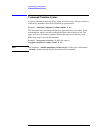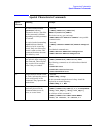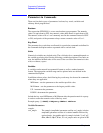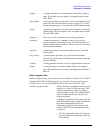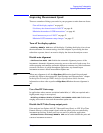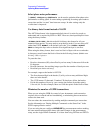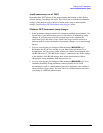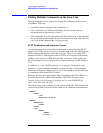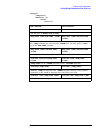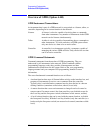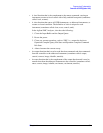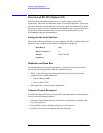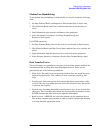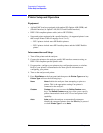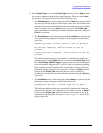
48 Chapter 1
Programming Fundamentals
Putting Multiple Commands on the Same Line
Putting Multiple Commands on the Same Line
Multiple commands can be written on the same line, reducing your code space
requirement. To do this:
• Commands must be separated with a semicolon (;).
• If the commands are in different subsystems, the key word for the new
subsystem must be preceded by a colon (:).
• If the commands are in the same subsystem, the full hierarchy of the command
key words need not be included. The second command can start at the same key
word level as the command that was just executed.
SCPI Termination and Separator Syntax
A terminator must be provided when an instrument is controlled using RS-232
(Option 1AX). There are several issues to be understood about choosing the proper
SCPI terminator and separator when this is the case. There is no current SCPI
standard for RS-232. Although one intent of SCPI is to be interface independent,
<END> is only defined for IEEE 488 operation. At the time of this writing, the
RS-232 terminator issue was in the process of being addressed in IEEE standard
1174.
A semicolon (;) is not a SCPI terminator, it is a separator. The purpose of the
separator is to queue multiple commands or queries in order to obtain multiple
actions and/or responses. Make sure that you do not attempt to use the semicolon
as a terminator when using RS-232 control.
Basically all binary trace and response data is terminated with <NL><END>, as
defined in Section 8.5 of IEEE Standard 488.2-1992, IEEE Standard Codes,
Formats, Protocols and Common Commands for Use with ANSI/IEEE Std
488.1-1987. New York, NY, 1992.
The following are some examples of good and bad commands. The examples are
created from an EMC analyzer with the simple set of commands indicated below:
[:SENSe]
:POWer
[:RF]
:ATTenuation 40dB
[:SENSe]
:FREQuency
:STARt
:POWer
[:RF]
:MIXer
:RANGe
[:UPPer]



